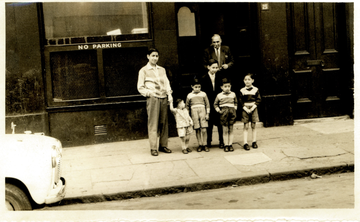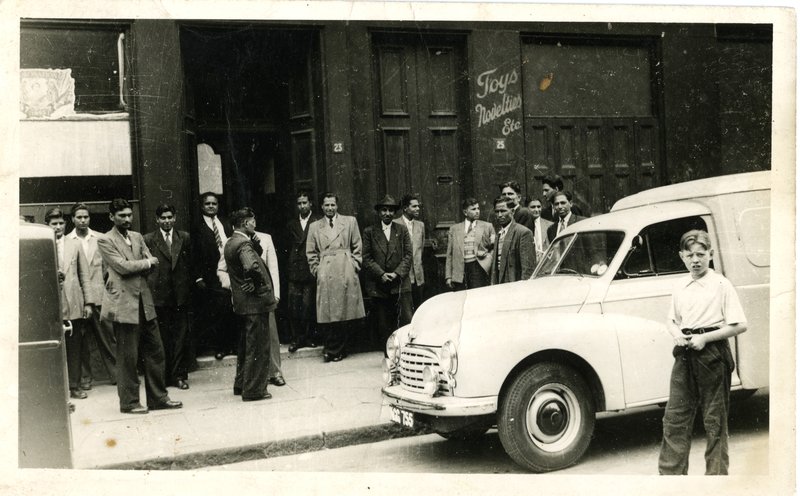
Atta Muhammed Ashrif
‐
Business owner and the founder of Jamiat Ittihad ul Muslimin, the first Muslim organization in Scotland
Other names
Ata Muhammad Ashraf
Place of birth
Date of arrival to Britain
Place of death
Glasgow, Scotland
Date of time spent in Britain
1923–41, 1945–99
About
Atta Mohammed Ashrif was born in Ludhiana, India in 1903. His father, Mohammad Eiddu, was a farmer. He married Sarah Bibi in 1922, with whom he had three children. In 1926, Ashrif migrated with his cousin to Glasgow, where the South Asian population was relatively small. When he migrated, there were around forty-five South Asian men in Glasgow, many of whom came from farming villages in Jalandhar. There was also a small number of ex-seamen from Mirpur in Kashmir and Bengal, as well as ex-soldiers. Most of these men, including Ashrif, were pedlars and sold clothes door-to-door. Ashrif did this work across Lanarkshire, before moving to Belfast in 1927. After a short period in Belfast, Ashrif moved to London in 1930 and worked as a market trader.
In London, Ashrif met Imdad Ali Qazi, a scholar and jurist who came to Britain to study at the London School of Economics and, later, the School of Oriental and African Studies, where he encountered other prominent Indian Muslims. Qazi founded the Jamiat ul Muslimin in London with a group that included Ashrif. Through the organization, Ashrif became involved in community activism, which included supporting destitute Indian seamen. Whilst in London, Ashrif married Lily, who changed her name to Zainab upon converting to Islam.
Ashrif returned to Glasgow with Zainab in 1933 to launch his wholesale supply business with Noor Mohammed Tanda, a pedlar who migrated to Glasgow in 1916. Their business, Tanda & Ashrif & Co., was located in a warehouse on 23 Nicholson Street in the Gorbals area of Glasgow and supplied pedlars with wholesale clothing. These goods were, at times, sold on credit to support pedlars who were facing financial difficulty. These clothes were sold across Scotland, including Lewis and Stornoway. Between 1941 and 1945 Ashrif returned to India with Tanda. Ashrif continued the business until 1974, when a compulsory purchase order was placed on the warehouse and the adjoining house where Ashrif and his family lived as part of a regeneration programme in Gorbals. The family relocated to Kings Park.
Alongside his business, Ashrif founded the Jamiat ul Muslimin (known as the Jamiat Ittihad ul Muslimin from 1945) in Glasgow in 1933. This was the first Muslim organization in Scotland and Ashrif was Jamiat ul Muslimin’s first President. Members of the organization met weekly and worked together to find a place of worship. In 1944 the organization converted an established building on Oxford Street, Gorbals, to establish the city’s first mosque. The work to create a purpose-built mosque began in 1958, when a planning committee was created which included Bashir Maan. The Central Mosque in Glasgow, the city’s first purpose-built mosque, was the outcome of this early organizing; the Central Mosque adopted the founding constitution of Jamiat Ittihad ul Muslimin when it was established.
Ashrif and Zainab had one daughter, Janet (pronounced Jannat), who was born in 1937. In 1942 Ashrif and Zainab divorced. Ashrif's son Muhammad Ibrahim Ashrif, who settled in Glasgow in 1947, attended the University of Edinburgh where he obtained a PhD in agriculture. Dr Ashrif subsequently became a member of the British Foreign Service and worked as a scientific officer for the agricultural board in Gambia during the 1950s and 1960s. Dr Ashrif was awarded an MBE for his research.
Ashrif died on 24 January 1999 in Glasgow.
Ansari, Humayun, The Infidel Within: Muslims in Britain since 1800 (London: Hurst, 2018)
Colourful Heritage, 'South Asians in Scotland: Their Migration Story and Cultural Identity', School Resource Pack Unit 5, https://www.colourfulheritage.com/projects/schools/#pack
Colourful Heritage, 'Zahid Ashrif Interview' (16 July 2020), https://www.youtube.com/watch?v=zUif0cvMpTA
Maan, Bashir, The New Scots: The Story of Asians in Scotland (Edinburgh: John Donald Publishers, 1992)
Maan, Bashir, ‘Ata Muhammad Ashraf’, Herald Scotland (30 January 1999)
Razzaq, Saqib, 'Meet the GlaswegAsians: Glasgow’s South Asian Heritage', Historic Environment Scotland (21 June 2019), https://blog.historicenvironment.scot/2019/06/glasgows-south-asian-history/
Ahmed, Mashood, Atta Muhammad Ashrif: Sher Muhammad Family, Ancestry.co.uk
CH 1/2/3, Newspaper cuttings, Bashir Maan Collection, Mitchell Library, Glasgow

Tanda & Ashrif Warehouse, Glasgow, 1930s. Courtesy of Colourful Heritage, the Bashir Maan Archive and the Ashrif Family.
Image credit
A photograph of Atta Ashrif outside Tanda & Ashrif & Co Warehouse, Gorbals, Glasgow. Courtesy of Colourful Heritage, the Bashir Maan Archive and the Ashrif Family.
